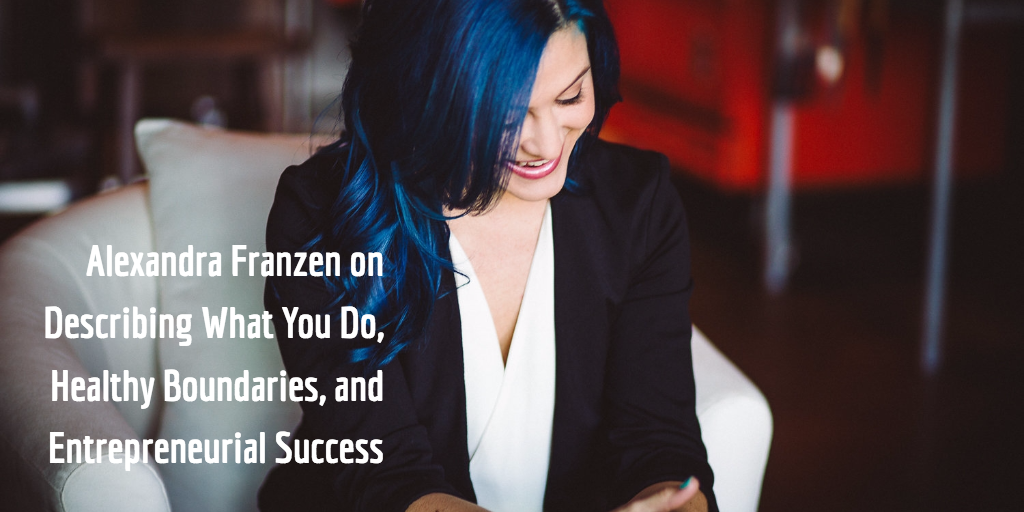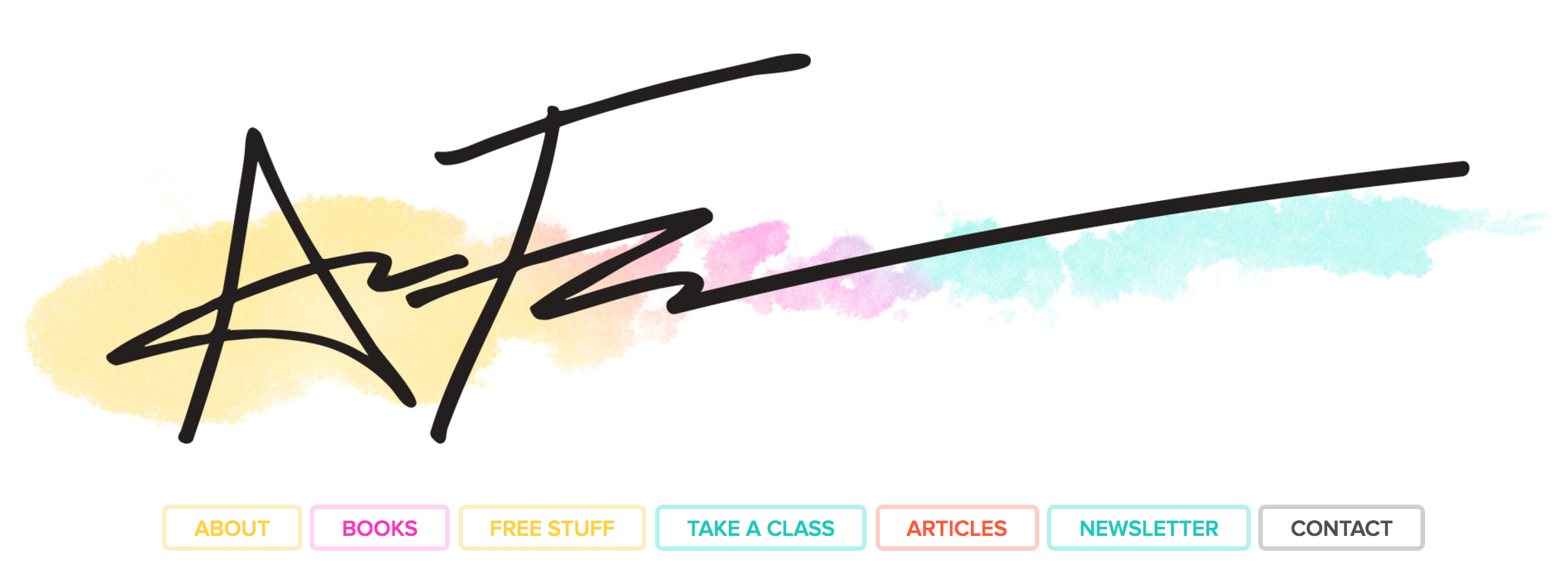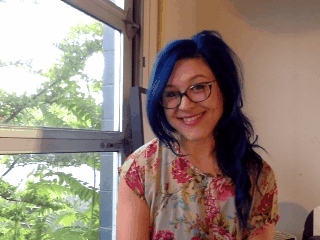Alexandra Franzen on Describing What You Do, Healthy Boundaries, and Entrepreneurial Success
Once in a long while -- too rarely -- do I come across someone who is modeling authentic, simple marketing in a way that makes me go "wow" ...and want to share forward.
Alexandra Franzen is deeply resonant with her audience, yet without pushing. Gives so much value, with gentleness.
1. I loved her blog post about creating little miracles. It's a about simple question that helps us focus on making a better offering and doing better marketing.
2. And check out her newsletter opt-in page. She has a significant following because of the value she provides in her newsletter, and yet the opt-in invitation itself is gentle.
I'm going to be learning from Alexandra's way of doing "marketing", or simply, how she serves publicly.
Gratefully she agreed to a written interview. Here it is below!
Throughout this blog post I'll feature photos from Alexandra's website, including her adorable moving-GIF's such as this one:
GEORGE:
You have worked closely with some high profile clients including Danielle LaPorte and Marie Forleo, as well as many more lesser-known businesses. Have you noticed any patterns of success? What do the viable businesses have in common, that we might learn from? And the ones that struggle to make it work — what do they have in common, that we might learn to avoid?
ALEXANDRA:
This is such a great question. To answer it, I’ll tell a quick story…
I have a client who wrote a book. She wanted her #1 business hero—a famous, influential entrepreneur who’s very busy and difficult to reach—to endorse her new book.
My client mailed a copy of her book to her hero. No response. She emailed to follow up. No response. At this point, most people would give up and figure, “Never mind, forget it.” But not my client...
My client got on a plane. She flew to a conference where her hero was speaking. She stayed until the very end. Then she marched up to her hero to hand over a copy of her book in person. She said, “I’ve admired you for so long. Your work has changed my life. I know you’re very busy, so no pressure, but… it would mean the world to me to have you peek at my book and consider endorsing it.”
This finally got her hero’s attention! She was impressed by my client’s go-getter spirit. She accepted the book and said she’d be in touch soon. (Hooray!)
The moral of the story is… as entrepreneurs, we can’t allow ourselves to give up after one or two discouraging experiences. We have to keep marching forward. And, we have to go the extra mile—like my client did. That’s what successful entrepreneurs do.
A great question to consider is, “How could I go the extra mile to impress my clients and get everyone raving about me?” Or, “How could I go the extra mile to get my hero’s attention and inspire them to mentor me?”
Could you send a handwritten “thank you” card in the mail? Could you make a personalized video message with BombBomb? Could you do something courageous and totally out of your comfort zone—showing up in person, like my client did?
Most of us give up way too easily. Successful entrepreneurs are the people who refuse to give up, and who always put in 10% more effort (and courage) than everybody else.
GEORGE:
Such a great answer — I agree! And I actually have my own example to share.
9 months ago, I received in the mail a physical letter from a reader of mine (I can count on one hand the pieces of physical fan mail I get each year...) It was a hand-made card. Nothing over the top, but it was hand made!
I found this person on Facebook and thanked her. Over the next few months, she kept in touch with an occasional email sharing a few specific links to articles or videos that reminded her of my work.
The special thing about her emails to me was that it was always tailored to what she understood to be my interests/personality, given that she had been following some of my content. She even created this infographic sharing some of her favorite quotes from me!
We struck up a conversation through these emails, and when I found out that she was looking to gain more experience as a coach (without trying to pitch me), and I went ahead and hired her. I’m already a fan.
So yes — doing something different to really show one’s respect and care is a wonderful thing to do, and can often help with business in unexpected ways.
Alexandra, this also reminds me of a couple of blog post from your site, in fact the first posts that introduced me to your work…
You have worked closely with some high profile clients including Danielle LaPorte and Marie Forleo, as well as many more lesser-known businesses. Have you noticed any patterns of success? What do the viable businesses have in common, that we might learn from? And the ones that struggle to make it work — what do they have in common, that we might learn to avoid?
ALEXANDRA:
This is such a great question. To answer it, I’ll tell a quick story…
I have a client who wrote a book. She wanted her #1 business hero—a famous, influential entrepreneur who’s very busy and difficult to reach—to endorse her new book.
My client mailed a copy of her book to her hero. No response. She emailed to follow up. No response. At this point, most people would give up and figure, “Never mind, forget it.” But not my client...
My client got on a plane. She flew to a conference where her hero was speaking. She stayed until the very end. Then she marched up to her hero to hand over a copy of her book in person. She said, “I’ve admired you for so long. Your work has changed my life. I know you’re very busy, so no pressure, but… it would mean the world to me to have you peek at my book and consider endorsing it.”
This finally got her hero’s attention! She was impressed by my client’s go-getter spirit. She accepted the book and said she’d be in touch soon. (Hooray!)
The moral of the story is… as entrepreneurs, we can’t allow ourselves to give up after one or two discouraging experiences. We have to keep marching forward. And, we have to go the extra mile—like my client did. That’s what successful entrepreneurs do.
A great question to consider is, “How could I go the extra mile to impress my clients and get everyone raving about me?” Or, “How could I go the extra mile to get my hero’s attention and inspire them to mentor me?”
Could you send a handwritten “thank you” card in the mail? Could you make a personalized video message with BombBomb? Could you do something courageous and totally out of your comfort zone—showing up in person, like my client did?
Most of us give up way too easily. Successful entrepreneurs are the people who refuse to give up, and who always put in 10% more effort (and courage) than everybody else.
GEORGE:
Such a great answer — I agree! And I actually have my own example to share.
9 months ago, I received in the mail a physical letter from a reader of mine (I can count on one hand the pieces of physical fan mail I get each year...) It was a hand-made card. Nothing over the top, but it was hand made!
I found this person on Facebook and thanked her. Over the next few months, she kept in touch with an occasional email sharing a few specific links to articles or videos that reminded her of my work.
The special thing about her emails to me was that it was always tailored to what she understood to be my interests/personality, given that she had been following some of my content. She even created this infographic sharing some of her favorite quotes from me!
We struck up a conversation through these emails, and when I found out that she was looking to gain more experience as a coach (without trying to pitch me), and I went ahead and hired her. I’m already a fan.
So yes — doing something different to really show one’s respect and care is a wonderful thing to do, and can often help with business in unexpected ways.
Alexandra, this also reminds me of a couple of blog post from your site, in fact the first posts that introduced me to your work…
- Why I want to be a daymaker
- Don’t “write blog posts” or “launch products.” Create little miracles.
GEORGE:
Let’s say you have a new client who is providing a service of personal transformation that’s not yet mainstream, i.e. they’re not providing a popular service like “psychotherapy” or “massage”. And they’re having a hard time getting people interested in their unique modality. What words of advice might you give to them?
ALEXANDRA:
If you’re providing a service that most people don’t know much about, it’s crucial to describe it simply and clearly. Try to come up with a description that a 9-year-old kid would understand. Simple. Direct. No jargon.
For example, you could say:
“I’m a Reiki practitioner. Reiki is an ancient healing process from Japan. It’s mainly used for stress relief and relaxation. If you’ve ever gotten a massage, or if you’ve tried acupressure, yoga, or meditation, then you’d probably enjoy Reiki too, because the eff ects are pretty similar. Here’s my card with a link to my website. I have some videos there with more info about Reiki, if you’re curious…”
If someone said that to me, even if I’d never heard of Reiki before, I’d probably get the gist of it, and I’d be intrigued!
If you really struggle to sum up what you do, another option is to describe one of your current projects. “Right now, I’m working on…” or “This month, I’m working on…”
For example, you could say:
“I’m a life coach. I work with clients 1-on-1 and I teach classes, too. Right now, I’m teaching a class for women who want to start dating again. It’s so much fun! We cover topics like self-confidence, style, body language, date night ideas, and of course, how to build up the confidence to put yourself ‘out there’ again.”
Sometimes, just saying your “job title”—like “life coach”—isn’t quite enough. People might not get it. But when you describe a specific project—like a podcast, book, product, or class—then you’re painting a clear picture in your listener’s mind, and it’s much easier for them to grasp what you do.
GEORGE:
You’ve been a prolific writer over the years, some of which can be seen in your awesome blog — www.AlexandraFranzen.com — and much more of your writing of course is in your private client work. I’m wondering how you relate to Flow vs Structure … to what extent do you schedule your day? Or do you work whenever you find the inspiration?
I’m a pretty structured person. Every night, before I go to bed, I print out my “production list” for the upcoming day. This list includes exactly what I intend to work on—or “produce,” you could say.
Some days, I’m working on projects for my clients. I might be writing (or editing) a podcast script, a book manuscript, a speech or presentation. It’s always something different.
Other days, I’m working on my own personal writing projects—my newsletter, articles, books, and so on.
And other days, it’s more of an “administration day”—emails, invoices, things like that.
I’m very introverted, and I recharge and get inspired by spending time alone. So, if several weeks have gone by and I haven’t had a single day to be alone, that’s not good. I try to schedule alone-time for myself. This year I went to Hawaii—by myself—for a week. It was incredibly energizing! Another time, I checked myself into a hotel—right in my city—for 2 nights so that I could focus intently on a big project with no distractions. It turned out to be a great investment—I got so much done!
From George: If you have a couple of project ideas and need help to prioritize, check out Alexandra's blog post How to choose your next big thing.
GEORGE:
Great idea re: scheduling alone time. A lot of introverts also happen to be helpers, and have a hard time saying “no” to things. You get a lot of requests nowadays for your time and attention. Any tip or encouragement you’d like to share re: keeping better boundaries?
ALEXANDRA:
Keeping boundaries! This is something I’m still trying to work on.
I love helping people, and I also love intimacy (personal emails, handwritten cards, 1-on-1 and small group experiences). But when you’ve got over 13,000 people in your community and on your mailing list… then it becomes difficult to extend that kind of “personalized touch” to everyone. Sadly, it’s just not possible.
Over the years, I’ve needed to set up some personal (and business) policies for myself.
Some of my current policies are:
- I don’t give away “free advice” via email. (If someone emails me asking for advice, I encourage them to type their question into this GoogleDoc, which is where I store all kinds of great questions. I often pull questions from that doc and then answer them on my blog, sort of like a public advice column.
- I sometimes get requests from people who say, “Hi, we’ve never met before, but I’m passing through Portland and I’d love to meet up for coffee!” or something like that. With very few exceptions, I’ll usually decline. I already have a very full life—I have enough clients, I have wonderful friends, my schedule is usually bursting at the seams—so meeting up with someone I barely know (or don’t know at all) just doesn’t sound very appealing to me. This may sound “cruel” and “cold,” but the reality is, we only have 24 hours in every day! We can’t say “yes” to every invitation and still have time to eat, sleep, and bathe occasionally, you know?
- I don’t reply to emails immediately. Most of us get hundreds of emails every week, and there’s this unreasonable expectation that everything must be answered instantly! It’s crazy! I think we could all use a little more patience with ourselves, and with one another. I have a statement on the Contact page of my website that says:
Like most people these days, I get a lot of emails. Sometimes I reply within 30 seconds. Other times, it might take me 30 days to get back to you. And sometimes, depending on the request, I might ask my assistant to reply on my behalf. Please know that I do appreciate every single email I receive. Thanks for your patience and understanding!
I like that statement, because it helps to manage people’s expectations when they email me. A friend once told me that I reply to emails at a “European pace” (relaxed, unhurried) rather than an “American pace” (frenzied, instant). Haha! I took this as a compliment.
GEORGE:
In my line of work, I see (and give opinion on) a lot of websites. Most of them don’t get me to stay for more than a minute. Yours got me to hang out for longer than I expected, and I keep sharing it with others. What were/are your guiding principles for your website design? What would you suggest for someone who is (re-)designing their website?
I’m honored that you like my website… thanks!
I feel that your website design should be intentional, always holding in mind, “How do I want my website visitor to feel?”
With my website, my intention is to create a feeling of encouragement, positivity, and simplicity. I want people to visit my site and feel like they can exhale, like everything’s going to be OK. I want people to feel calm and energized, like they’re hanging out with a supportive friend. I want people to feel a “no pressure” sensation, too, like there’s no immediate pressure to “do” or “purchase” anything. I want people to take their time, get to know me, and then eventually purchase a book, class, come to retreat, hire me… or not! There’s no pressure at all.
With those intentions in mind, I chose a website design that’s very simple, with lots of white space, not too many bells and whistles, very basic, and no “commands” barking at you anywhere, just gentle, “no pressure” invitations. There’s a photo of me on the homepage, and a brief welcome note, and about 6 or 7 things to explore in the top navigation bar, and… that’s it! Pretty simple.
I’ve seen a lot of business owners invest $10,000 (or more) to have someone build a super-complicated website with all kinds of unnecessary features, and then they wind up feeling disappointed—sometimes even hating their website, or feeling embarrassed by it! Website shame! Oh noooo!
My advice is: keep it simple. Especially if you’re just starting out, get yourself a Squarespace account, or a Wordpress account, hire a photographer to take a few professional photos of you (and/or your products), and then build yourself a clean, simple site. You can always upgrade to a “fancier” website later, if you really want to. But most of the time, simple is good.
NOTE from George: I highly recommend Weebly, which is what my website has been based on since 2009. I've had many clients change from Wordpress to Weebly and have been happy with the switch. It's simpler, much easier to use, more secure, less hassle.
ALEXANDRA:
And, just tossing this out there… do you really need a website? We live in a culture where we assume, “Everyone MUST use social media! Every entrepreneur MUST have a website!” and so forth. Is it really true?
I know a woman who works as a massage therapist and yoga/fitness instructor who’s booked solid—basically until the end of time—and she doesn’t have a website. She gets hired because of word-of-mouth referrals, and because happy clients book her again and again, over and over. I don’t think she even has a business card.
So, it’s worth considering... “Do I really need a website? Do I really need to run Facebook ads? Do I really need a Twitter account? Do I really need a virtual assistant?” And so forth. Maybe you do. Or maybe you don’t. It’s interesting to sit with these questions. Rather than doing things automatically, or doing things because “that’s what most people do,” I think it’s valuable to question everything.
GEORGE:
The woman you mentioned who is booked solid until the end of time, even without a website -- she's obviously very talented at what she does, given her amazing word-of-mouth and repeat business. You, too, are extraordinarily talented at what you do, and not surprisingly, you are always booked solid for months. Do you have any encouragement for someone who sometimes doubts her own talent, that no matter what she does, she'll never be able to build a successful business/career, because of lack of natural talent... even if she might have a passion for what she wants to do?
ALEXANDRA:
If you feel doubtful about your abilities, my recommendation is to make a list of your "victories."
Write down anything you can remember. Personal victories. Professional victories. It could be a combination of... Projects you've completed. Tasks you did really well. Clients who expressed positive feedback about your work. Challenges you overcame. Goals you achieved.
Make a big list. Then read it back to yourself to remind yourself, "Oh, wow! I did all that stuff! That was me!"
This can help to reinforce that you are smart and capable, and that you can achieve whatever goal you've set for yourself next.
GEORGE:
Wonderful. I also recommend people check out these posts of yours:
The woman you mentioned who is booked solid until the end of time, even without a website -- she's obviously very talented at what she does, given her amazing word-of-mouth and repeat business. You, too, are extraordinarily talented at what you do, and not surprisingly, you are always booked solid for months. Do you have any encouragement for someone who sometimes doubts her own talent, that no matter what she does, she'll never be able to build a successful business/career, because of lack of natural talent... even if she might have a passion for what she wants to do?
ALEXANDRA:
If you feel doubtful about your abilities, my recommendation is to make a list of your "victories."
Write down anything you can remember. Personal victories. Professional victories. It could be a combination of... Projects you've completed. Tasks you did really well. Clients who expressed positive feedback about your work. Challenges you overcame. Goals you achieved.
Make a big list. Then read it back to yourself to remind yourself, "Oh, wow! I did all that stuff! That was me!"
This can help to reinforce that you are smart and capable, and that you can achieve whatever goal you've set for yourself next.
GEORGE:
Wonderful. I also recommend people check out these posts of yours:
I subscribe to very few newsletters. Alexandra's is one that I almost always open and read. I highly recommend it -- Alexzandra Franzen Newsletter.







